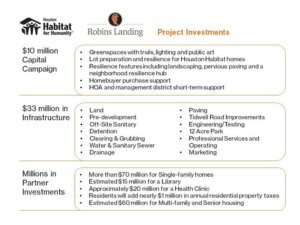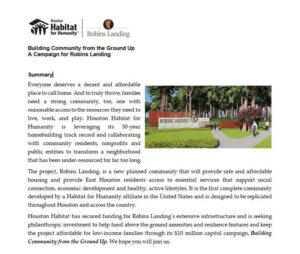Vision
Robins Landing will be a place to call home for families in need of safe and affordable housing. This new 127-acre mixed-use master-planned community of affordable and energy-efficient single-family homes and multifamily units was designed with extensive community input from residents and public and nonprofit organizations.
Everyone deserves a decent and affordable place to call home, one with reasonable access to the resources they need to live, work, and play. Robins Landing will offer affordable homes in a beautiful community with parks, gardens, healthcare, a library, banking and more, for individuals in all stages of life.
Houston Habitat is utilizing an innovative funding model to secure the $43 million needed for the development and infrastructure of Robins Landing.
-
Houston Habitat as Developer is contributing the land
-
Partner builders are purchasing lots to build single-family homes
-
Amenity partners are purchasing pad sites for their services
-
Multi-family and Senior unit builders are purchasing pad sites
-
Zero and low interest construction loans
-
An investment from the City of Houston
Campaign Progress
Funds raised through the capital campaign will go toward:
-
Parks and greenspaces with trails, lighting and public art
-
Resilience features such as landscaping, pervious paving and a neighborhood resilience hub
-
Lot preparation and resilience for Houston Habitat homes
-
Homebuyer purchase support
-
Short term support for HOA and management district
Honorary Committee
-
Joni Baird
-
Brian Ching
-
Reverend Harvey Clemons, Jr.
-
Dr. Giuseppe Colasurdo
-
Percy and Cheryl Creuzot
-
Gaynell Floyd Drexler
-
Lance Gilliam
-
Lee Herman
-
Shashank Karve
-
Leela Krishnamurthy
-
Bill Kroger
-
John Mooz
-
Camilo Parra
-
Joe Samuel Ratliff
-
Ann Taylor
-
Anne Umland
-
Mia Wright
Case for Support
Need
Everyone needs an affordable place to call home, but Houston lacks enough affordable housing to meet the demand. Recent events such as major disasters, rising median home prices and the economic downturn have reduced the number of affordable housing units even more. In fact, 1 in 7 Texans now pays 50% or more of their incomes for housing, leaving them to make difficult choices with what little remains. And the COVID-19 pandemic has made clean, well-maintained housing that is not overcrowded a matter of life or death.
Owning a home is key to wealth building. In fact, home equity is the major source of wealth for families in the US. Renewed calls for racial equity have placed focus on the systemic denial of homeownership opportunities, resulting in low and declining rates of homeownership by people of color. Increasing homeownership for people of color will help to close the wealth gap.
To thrive, people need access to a strong community with access to services and amenities that promote social connection, economic development and healthy, active lifestyles.
Impact
Houston Habitat is committed to addressing the affordable housing crisis because we believe that everyone deserves a decent and affordable place to call home. By creating Robins Landing, we will:
- Significantly expand the supply of safe, secure, and affordable housing in Houston
- Create a community that supports residents in increasing their financial stability
- Make it possible for many more households to reduce their housing cost burden, pay for other essential needs, and accrue assets to build generational wealth
- Promote healthy lifestyles and community social connection
- Drive neighborhood-wide change by expanding residents’ access to public transportation, health care, job skills training, and childcare
- Increase economic investment and prosperity in East Houston
The Case for Affordable Housing
Improving affordable homeownership leads to numerous outcomes that extend beyond the house, such as greater economic stability, access to quality education, increased civic and social engagement, better health, and a reduced environmental footprint.
Financial Stability and Wealth Building
Homeownership is a catalyst to wealth building for U. S. households and represents a significant proportion of wealth for low-income and Black and Hispanic/Latinx households.
U.S. homeowners have an average net wealth that is 400% higher than that of renters with similar demographics and earnings.
Research has shown a correlation between homeownership and increased wealth, with each year of homeownership tending to be associated with an additional $9,500 in net wealth, on average.
Houston Habitat partners with families to lower barriers to affordable homeownership and create opportunities for those who may not otherwise have access to owning a home, enabling them to grow their net wealth through forced savings and property value appreciation.
Educational Opportunity
Habitat helps families with children access homeownership. In FY2020, 77% of the families we served through new construction had dependents. By partnering with these families to enable their goal of homeownership, Habitat can help their children attain greater educational success and improve their chances of accessing post-secondary education.
Homeownership leads to better test scores and higher rates of high school graduation and college attendance, especially among children of low-income homeowners.
Homeownership contributes to higher standardized test scores in math, and for those with a longer homeownership tenure, increased test scores in reading.
Children of low-income homeowners are 11% more likely to graduate from high school and are 4.5% more likely to complete post-secondary education than children of low-income renters.
Homeowners can leverage their housing wealth to finance post-secondary education for their children, especially lower- and moderate-income households. For lower- and moderate-income households, a$10,000 increase in housing wealth raises the probability of college attendance by 14%.
Habitat offers families stability through shelter, which benefits children through consistency in schooling and minimized disruptions to their education. Habitat also partners with families to provide affordable housing that matches their needs and may reduce overcrowding, thus facilitating more conducive study environment.
Community Engagement
Regardless of income level, homeownership promotes civic and social engagement.
Homeowners are more likely to vote in local elections than renters in comparable neighborhoods, and this likelihood increases with the degree of neighborhood disadvantage in low-income urban areas.
Regardless of the length of time they have owned a home, homeowners are 1.3 times more likely to become involved in a neighborhood group and to join a civic association than renters. The increased participation in neighborhood groups holds true in low-income neighborhoods as well.
Low- and moderate-income homeowners have more social capital resources, such as a larger social network within their community, than do renters at similar income levels.
Habitat requires future homeowners to contribute “sweat equity” by volunteering a certain number of hours on a build site (either for their home or another family’s home). This investment by families in both their home and their neighbors’ homes helps contribute to the sense of community among homeowners.
Pre-purchase support programs, such as financial education classes, also help build networks among Habitat homeowners, and volunteer engagement on home builds and other Habitat events can strengthen relationships with the local community.
Habitat engages families, volunteers and community members in civic decision-making through advocacy for policies and resources that help more people access a quality place to live in a thriving community.
Economic Impact
Robins Landing will produce $93,600,000 in taxable value and $750,000/year in incremental property taxes to the City of Houston.
By increasing economic investment in East Houston, Robins Landing will attract businesses to invest in the community creating job opportunities and greater access to retail and dining for residents.
Racial Equity
Sadly, homeownership is out of reach for most low-income families because they have been systematically denied access to affordable mortgages. The resulting homeownership gap is greatest for Black and Hispanic/Latinx families and is widely recognized as the major source of wealth disparities between Whites and people of color in the United States.
Home equity represented a larger share of net wealth for low-income households and Black and Hispanic/Latinx households.
In FY2020, 49% and 44% of families served by Houston Habitat were Black and Hispanic/Latinx, respectively — Houston Habitat’s focus on working with low- and moderate-income families and serving a diverse network of homeowners means that the home equity Habitat families gain likely constitutes a large share of their overall net wealth.
Fosters Health and Wellness
Decent, affordable housing improves physical and mental health.
Homeowners are more likely to occupy homes with fewer repair needs than renter households, and housing problems are more acute for low-income households.
The U.S. Centers for Disease Control and Prevention identified home improvement as one of six evidence-based, high-impact solutions for addressing social determinants of health. Improving housing quality improves general health status, respiratory health and mental health and reduces the risk of injury.
Decreasing housing costs for cost-burdened households (those spending more than half of their household expenditures on housing) releases resources to spend on nutritious food and health care and limits overcrowding to minimize the spread of respiratory infectious diseases.
According to Children’s Health Watch, unstable housing for families with children leads to $111 billion in increased health and educational costs over 10 years.
Houston Habitat lowers the cost of homeownership and makes it easier for future homeowners to access quality housing. Thanks to their affordable mortgages, families who partner with Habitat have the ability to prioritize investing in their families’ health and wellness.
Reduced Energy Consumption
Habitat’s energy-efficient designs generate financial savings for homeowners by lowering utility costs, which are typically the second greatest monthly expense after mortgage payments.
Newer homes have greater energy efficiency than older homes. As of 2015, 17% of single-family homes built before 1980 lacked proper insulation, 21% of homes had heating systems at least 20 years old, and only 11% had received an energy audit. In contrast, only 1% of homes constructed after 2009 had substandard insulation, and nearly 90% had double- or triple-pane windows.
For older single-family homes, weatherization reduces low-income households’ total energy costs by 12.4%within the first year. This is substantial given that low-income households have higher energy burdens, spending three times the share of their annual income(7.2%) on energy costs as compared with other households (2.3%).
Habitat builds new homes sustainably, using green building techniques and materials that increase the efficiency and durability of the home and use less resources. Many homes are Leadership in Energy and Environmental Design, or LEED, and Energy Star certified



